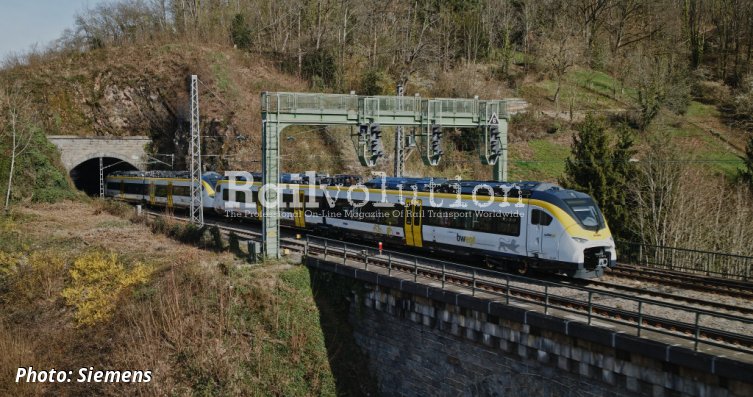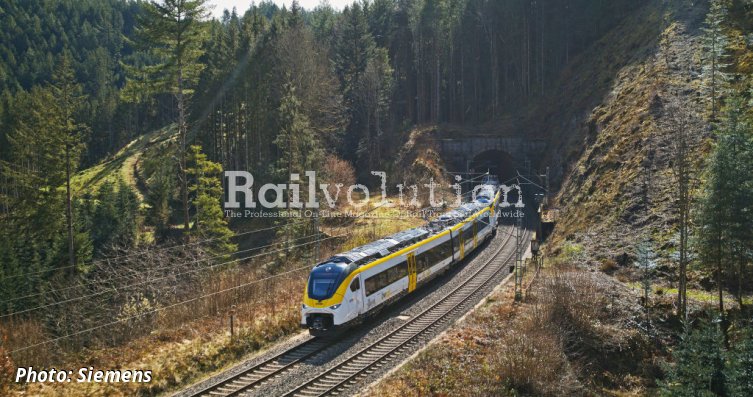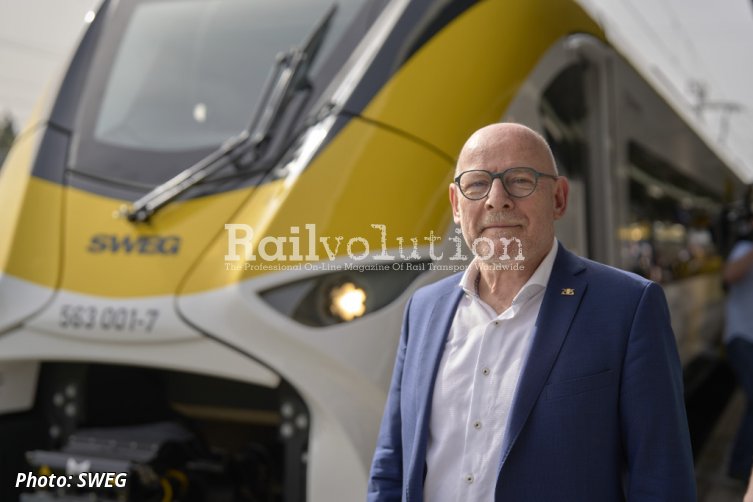Germany’s first use of the Mireo Plus B
updated on 15th Apr 2024 21:19 posted on 9th Apr 2024 01:21
On 8 April 2024 the first four Mireo Plus B trains from Siemens Mobility started regular passenger service, marking a premiere in Germany. The official start was celebrated by an exclusive inaugural trip from Offenburg to Oberkirch and back, and was accompanied by Winfried Hermann, Minister of Transport for the state of Baden-Württemberg, together with numerous invited guests.
The BEMUs will initially be used on the routes from Offenburg to Bad Griesbach and from Offenburg to Hornberg. They replace the RegioShuttle RS1 diesel railcars. Plans call for gradually extending hybrid service on other routes in the network. In preparation for introducing the Siemens Mobility trains, the network timetable was adjusted in mid-December 2023. Since then, trains in the Kinzig valley, for example, have been running straight through from Offenburg via Hausach to Hornberg without requiring changes. And passengers traveling to Freudenstadt usually have to change trains in Hausach, since the battery trains can serve the Freudenstadt station on the regular schedule only when an additional switch connection has been installed there.
We asked Siemens, why the passenger service did not start in December 2023 as initially planned? The company answered us: „The past few years have been volatile years for the manufacturing industry due to global crises, and Siemens has not been able to avoid bottlenecks in its supply chains. For this reason, the introduction of the Mireo Plus B battery trains for the Ortenau network has unfortunately been postponed by a few months.“
As a result of the timetable change in December 2023, passenger service has been improved by closing previous gaps in the schedule. Trains now operate at least on an hourly basis on all routes from early morning to evening. The whole SWEG fleet is numbered 563 001 to 027. The final Mireo Plus B is scheduled for delivery by spring 2025.
In the future, when the Mireo BEMUs will operate on the entire network and replace the RegioShuttles, they will slash consumption of diesel by around 1.8 million liters per year. In battery operation and under real conditions, the Mireo Plus B has a range of up to 120 km. Its batteries can be recharged from the overhead line and with energy from EDB. The battery system, installed beneath the floor, includes two battery containers holding lithium-ion batteries with a long service life.
In 2023 it was stated that the Mireo BEMU has a range of around 80 km under real conditions. Siemens explains to this: „Due to extensive testing of the Mireo Plus B on the Ortenau network, we can be certain that the train can run up to 120 km before its battery will need to be recharged.“
The principal technical data are:
- axle arrangement Bo' 2' Bo'
- power supply 15 kV 16.7 Hz
- top speed 140 km/h
- power 1,700 kW
- starting acceleration up to 1.1 m/s2
- Type SF7500 Jakobs bogies with inner gearboxes
- length over couplings 46,560 mm
- entrance door threshold height 610 mm over TOR
- all entrances have a sliding step
- max. axle-load 20 t
- crash suitability TSI and EN 15227 compliant.
Each unit has 120 seats and is equipped with a toilet, air conditioning and spacious multipurpose areas.
Siemens Mobility won Baden-Württemberg’s open-technology call for tenders for Network 8 with its Mireo Plus B design. This led to Baden-Württemberg’s State Agency for Rail Vehicles (SFBW) ordering 27 Mireo Plus B two-car BEMUs. They will be serviced and maintained by Siemens Mobility for SWEG for about 30 years in the newly built depot in Offenburg that opened in June 2023. The charging infrastructure for the new trains was installed by SWEG Schienenwege GmbH at the Achern and Biberach (Baden) stations.
Following the timetable change made in mid-December 2023, Network 8 (“Ortenau”) includes the following routes: Offenburg - Hornberg/Freudenstadt; Offenburg - Bad Griesbach; Offenburg - Achern - Ottenhöfen; and Biberach (Baden) - Oberharmersbach-Riersbach. In addition, the reactivated Hermann Hesse line between Calw and Renningen is planned to become part of the network as of 2025. All in all, Network 8 handles around 2.5 million train kilometers per year. The state of Baden-Württemberg awarded operation of the network to SWEG until December 2038.



